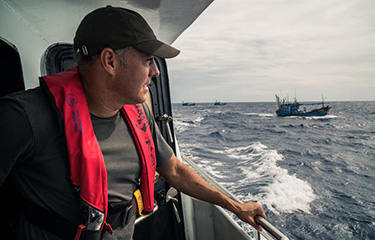Seafood processed by Uyghur forced labor in China has entered U.S. supply chains, according to an Outlaw Ocean report published in The New Yorker magazine.
Members of the Uyghur ethnic minority were relocated and forced to work in processing facilities operated by Chishan Group, Yantai Sanko Fisheries, Yantai Longwin Foods, Rongcheng Haibo, Rongchen Xinhui Aquatic Products, Shandong Haidu, and other Chinese seafood companies, according to the report, which was authored by Outlaw Ocean Project Founder Ian Urbina. The OutLaw Ocean Project is a nonprofit journalism organization that produces investigative stories about human rights, environment, and labor concerns related to the seafood industry. Urbina was the featured presenter in a May 2023 SeafoodSource webinar.
At least 47,000 metric tons of seafood, including cod, pollock, shrimp, salmon, crab, and squid, were sent to the U.S. from facilities that used Uyghurs as laborers, according to the report, which traced the product to retailers including Costco, Kroger, H Mart, and Safeway, and foodservice firms including Sysco and Performance Food Group.
Lund’s Fisheries, a U.S. squid supplier that works with Haibo, and High Liner Foods, which partners with Yantai Sanko, were implicated in the report. A High Liner spokesperson said Yantai Sanko had passed a third-party audit in September 2022. Lund’s President Wayne Reichle said the company has launched an investigation into its Chinese suppliers.
“Our suppliers are meeting our company’s supplier standards, which exceed U.S. import regulations,” he said.
Kenneth Kennedy, a former manager of the anti-forced-labor program at U.S. Immigration and Customs Enforcement, called for the U.S. government to block all seafood imports from China until it can be proven U.S. seafood supply chains are clear of abuse.
“The U.S. is awash with criminally tainted seafood,” he said.
The Outlaw Ocean Project acknowledged the difficulty of tracking the use of forced labor in China. It said it used private investigators to visit Shandong Haidu and Rongcheng Haibo facilities, but they could not confirm Uyghurs worked there because they were forbidden from talking with employees. Representatives of both companies said they had never employed workers from Xingjiang.
But using companies newsletters, social media posts, and independent reports from non-governmental organizations, the Outlaw Ocean Project found at least 10 Chinese seafood companies have used more than 1,000 Uyghur workers since 2018.
The project found many of the companies in question had been certified by the Marine Stewardship Council or passed a Sedex Members Ethical Trade Audit (SMETA) conducted by certification body S.G.S. MSC Head of Public Relations Jo Miller acknowledged the social auditing process has “significant limitations” and a Sedex spokesperson said it “may be difficult and risky for auditors themselves to explicitly recognize state-imposed forced labor” that “may have been covered up.”
The Outlaw Ocean Project named Walmart, Albertsons, Nomad Foods, Carrefour, Tesco, and Edeka as having received seafood tainted with Chinese forced labor. Albertsons said that it will cease its purchases of some seafood products from High Liner Foods in response to the report. Carrefour said it had commenced an investigation.
The report also found the U.S. government has spent more than USD 200 million (EUR 188 million) on seafood from importers tied to Uyghur labor for its public food programs, including its school lunch program.
“These revelations pose a very serious problem for the entire seafood industry,” Human Trafficking Legal Center Founder and President Martina Vandenberg said.
In a separate report, also published in The New Yorker on 9 October, the Outlaw Ocean Project tracked the use of forced labor onboard China's distant-water fishing vessels. It found mistreatment of migrant laborers to be a widespread practice across China’s massive, state-sponsored fleet, and human rights abuses that often led to injury or death of crewmembers.
Photo courtesy of The Outlaw Ocean Project







